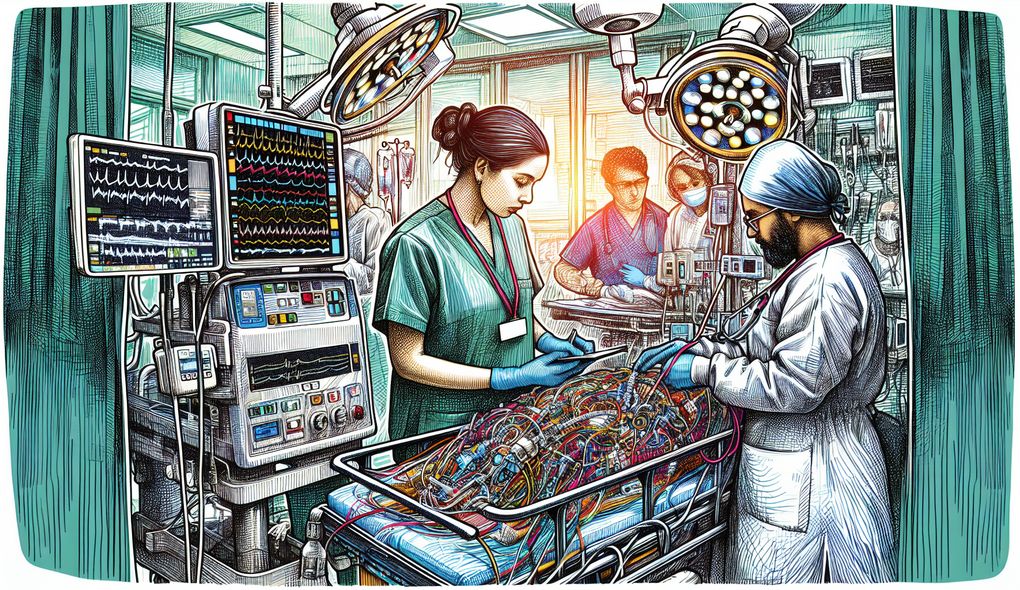What are your long-term career goals in critical care medicine?
INTERMEDIATE LEVEL

Sample answer to the question:
In the long term, I aspire to become a highly skilled critical care medicine physician who is known for providing exceptional patient care. I want to gain expertise in managing complex patient situations and making informed decisions in high-pressure environments. I also aim to contribute to the advancement of critical care medicine through research and clinical studies. Additionally, I want to develop my leadership skills to effectively lead a multidisciplinary team and improve patient outcomes. Continuous education and staying updated on the latest practices in critical care will be a priority for me to ensure I provide the best care possible.
Here is a more solid answer:
In the long term, my goal is to become a highly proficient critical care medicine physician who excels in managing complex patient situations and making quick, informed decisions. I will continuously strive to enhance my clinical skills to effectively diagnose and treat critical illnesses. Furthermore, I aim to develop excellent communication and interpersonal skills to establish strong relationships with patients, families, and the healthcare team. Staying updated on the latest advancements in medical technologies and life-support systems is crucial to provide the highest level of care. I am committed to continuous education, attending conferences and workshops, and actively participating in professional organizations to ensure I am well-informed and knowledgeable. As my career progresses, I also aspire to develop leadership skills that will enable me to guide a multidisciplinary team in the dynamic and high-stress environment of critical care. Moreover, I am eager to contribute to clinical studies and research projects to advance the field of critical care medicine. Ultimately, my long-term career goals are driven by a deep sense of empathy and compassion for patients and their families, and a dedication to providing the best possible care.
Why is this a more solid answer?
The solid answer provides more specific details about the candidate's goals and how they align with the skills and responsibilities mentioned in the job description. It emphasizes the importance of continuous learning, leadership development, and research involvement. However, it could benefit from further elaboration on the candidate's plans to contribute to the multidisciplinary team and their understanding of patient-centered care.
An example of a exceptional answer:
My long-term career goals in critical care medicine revolve around becoming a recognized leader in the field, known for delivering exceptional patient care and spearheading innovative advancements. I will continually strive to refine my clinical skills, particularly in managing complex patient scenarios, by regularly attending conferences, pursuing advanced training opportunities, and collaborating with esteemed colleagues. Communication is at the heart of providing quality care, which is why I will prioritize developing strong interpersonal skills to effectively connect with patients, families, and the interdisciplinary healthcare team. Furthermore, I am dedicated to staying at the forefront of technological advancements, continuously expanding my knowledge of advanced medical technologies and life-support systems. Continuous education is a lifelong commitment for me, and I plan to actively contribute to academic discussions, mentor medical students, and engage in multidisciplinary collaboration to stay updated on the latest practices and participate in cutting-edge research. To become an effective leader, I will seek out leadership development opportunities and foster a culture of teamwork, collaboration, and mutual respect within the critical care unit. I firmly believe that research is essential for advancing critical care practices, and I aspire to lead and participate in research initiatives that address critical gaps and push the boundaries of knowledge. Ultimately, my highest priority is always the wellbeing of patients and their families. I will approach each case with empathy, compassion, and unwavering dedication to the highest standards of care, ensuring that each patient receives individualized attention and support throughout their journey.
Why is this an exceptional answer?
The exceptional answer goes into greater detail about the candidate's aspirations in critical care medicine and demonstrates their commitment to excellence. It highlights their dedication to clinical skill development, communication, continuous education, leadership, research, and patient-centered care. The answer also emphasizes the candidate's desire to contribute to the growth of the field and their genuine empathy and compassion for patients. However, it could be further enhanced by providing specific examples of how the candidate plans to innovate and advance critical care practices.
How to prepare for this question:
- Research the latest advancements in critical care medicine and stay informed about emerging technologies and treatments.
- Attend conferences, workshops, and seminars related to critical care medicine to enhance your knowledge and network with experts in the field.
- Seek opportunities for advanced training and certifications to continuously improve your clinical skills.
- Develop strong communication and interpersonal skills by practicing active listening, empathy, and effective communication techniques.
- Become involved in research projects or clinical trials to contribute to the advancement of critical care medicine.
- Take on leadership roles or seek mentorship opportunities to develop your leadership abilities and guide a multidisciplinary team.
- Prioritize self-care to prevent burnout and maintain a compassionate and empathetic approach to patient care.
- Stay updated on ethical considerations and legal regulations related to critical care medicine.
- Maintain a growth mindset and embrace lifelong learning to adapt to the evolving landscape of critical care medicine.
What are interviewers evaluating with this question?
- Clinical skills and decision-making
- Communication and interpersonal skills
- Knowledge of advanced medical technologies
- Commitment to continuous education
- Leadership skills
- Research and analytical skills
- Empathy and compassion

